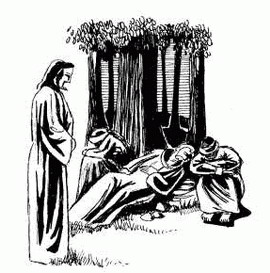15 Jun Jesus’s Satori – D.T. Suzuki & a Kick in the Eye
 When the Zen scholar Daisetz (D.T.) Suzuki was asked what it was like to have satori, he said: “Well, it’s like ordinary, everyday experience, except about two inches off the ground.” This kind of experience isn’t something we usually associate with Jesus of Nazareth, a prophet with his feet firmly rooted to the ground on which we walk, and who we like to see as fully wise, not needing any satori of sudden enlightenment.
When the Zen scholar Daisetz (D.T.) Suzuki was asked what it was like to have satori, he said: “Well, it’s like ordinary, everyday experience, except about two inches off the ground.” This kind of experience isn’t something we usually associate with Jesus of Nazareth, a prophet with his feet firmly rooted to the ground on which we walk, and who we like to see as fully wise, not needing any satori of sudden enlightenment.
But there is another translation of satori, and that is “a kick in the eye.” It is this kind of satori that Jesus experiences in the Gospel story. It occurs when he finds his trusty disciples sleeping in the garden of Gethsemane, unable to stay awake while he prays and waits for Judas’s betrayal. Having a crisis of faith where he asked God if he might be spared his fate, Jesus returned to his comrades to find that not one could stay awake with him.1
For Jesus, this was truly a kick in the eye. Stunned he asks the dozing Peter: “Could not you watch for one hour?” One imagines that he was also asking himself, “This is the guy I called ‘my rock’?”
Jesus experiences his satori at that moment. He realizes that he is truly on his own, as we all are, when it comes to matters of our personal fates, of the critical choices that are ours alone and which form our destinies.
- “I am sad at heart,” he said, “sad even to death; wait here, and watch.” Going on a little further, he threw himself on the ground, and began to pray that, if it were possible, he might be spared that hour. “Abba, Father,” he said, “all things are possible to thee; take away this cup from me; yet, not what I will, but what thou wills.” Then he came and found the three apostles asleep. “Simon,” he said to Peter, “are you asleep? Could not you watch for one hour?” – Luke 14: 34-37 [↩]
